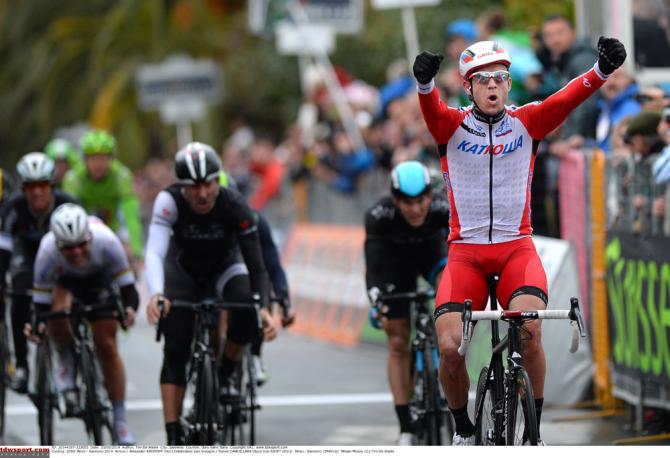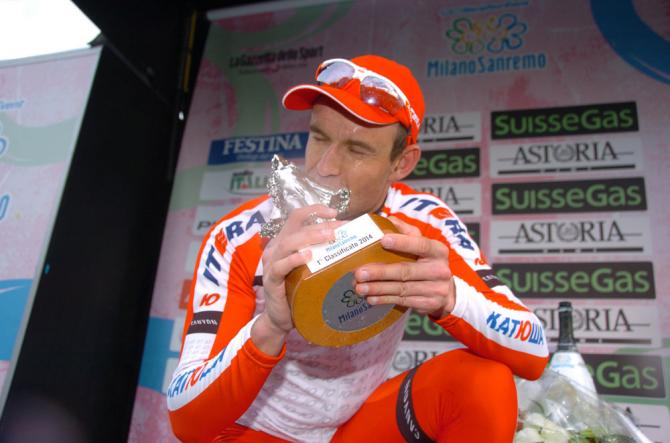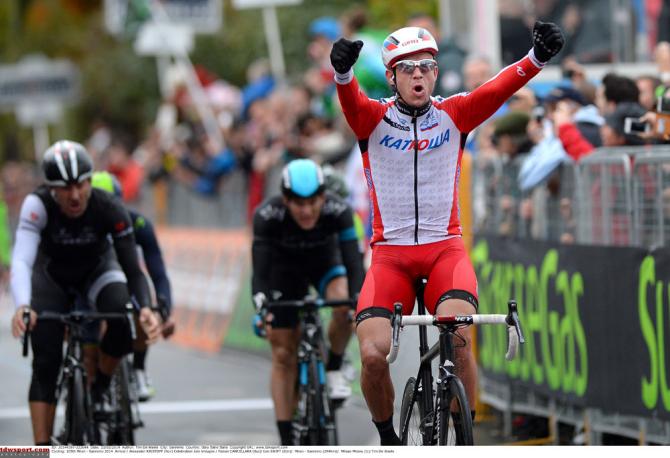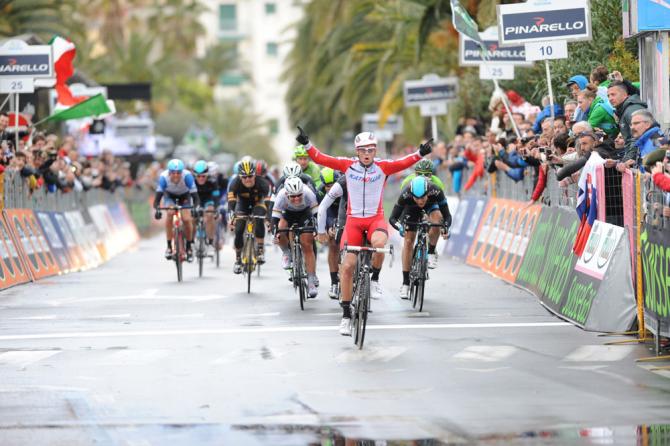Video: Kristoff hits his lines on the big stage at Milan-San Remo
Norwegian wins Lungomare sprint for second successive year




It would be easy to describe Alexander Kristoff’s scene-stealing Milan-San Remo victory as a surprise, but then that would overlook the fact that he trod the very same boards with such confidence in last year’s race.
Twelve months ago, on a similarly sodden and grey Sunday afternoon on the Lungomare Italo Calvino, the Norwegian unleashed a powerful effort to fend off Mark Cavendish in the sprint for 8th place, but this time around, he topped the bill.
After holding onto the leading group on the Poggio, Kristoff held his nerve admirably in a typically frenetic finale to La Classicissima, and then outkicked Fabian Cancellara (Trek) and Ben Swift (Sky) to the line, while Cavendish – who was a shade too far back as the sprint began, perhaps – had to settle for fifth place.
"Of course it’s a little surprise as I did not win the big classics or races like this before, but I was always up there," Kristoff said in his post-race press conference. "I was 8th here, 4th in Flanders and 9th in Roubaix, so it’s not a big surprise.
"I didn't expect it myself but I knew if I was good and lucky that it was not impossible. And also the team said that I could make a good result. I believed in it, but to actually win is something different, eh?"
Given that this ought to be the last Milan-San Remo before the belated insertion of the Pompeiana in the finale in 2015, the race was billed as something of a last-chance saloon for the fast men to triumph on the Riviera, and all eyes were duly on Cavendish and André Greipel as the main group shrunk in size on the Cipressa and Poggio.
"I tried to follow and stay in the pack, I didn't think about the others: I just wanted to survive the Poggio," Kristoff said. "I felt good but I didn't know about the others, because normally Greipel and Cavendish are faster than me. I was very happy to beat them, that was a big moment for me."
Get The Leadout Newsletter
The latest race content, interviews, features, reviews and expert buying guides, direct to your inbox!
Paolini
A sprint at Milan-San Remo is like no other, of course. For the sprinters themselves, there is the difficulty of hitting their lines with almost 300 kilometres already in their legs. The chaotic nature of the plunge from the Poggio, meanwhile, means that the script often gets thrown out the window when it comes to tactics, but Kristoff had help from the race’s best supporting actor, Luca Paolini, in the streets of San Remo.
The bearded Italian helped to shepherd Kristoff back towards the front after the Poggio, and then put in a mammoth turn on the front as the race entered the final kilometre. Paolini strung the leading group out in one, long line, while Kristoff sat in the box seat in second place.
"I was far back on the Poggio so Luca had to wait a while to bring me back," Kristoff said. "I wasn't with him, but he just knew what to do and brought me to the front. I just said, 'I'm here Luca,' and he brought me to the front. He could stay in the group, follow the attacks and he did a great job. I'm very thankful to him."
Kristoff himself showed sangfroid when Paolini swung over, smartly allowing Philippe Gilbert (BMC) to slip in front of him rather than hit the front too soon, before unfurling a crisp sprint finish in the final 150 metres to claim the biggest win of his career.
"This is a huge victory," said Kristoff, who only turns 27 in July. "I won a stage of the Tour de Suisse [2013] and came 3rd in the Olympics in 2012, but Milan-San Remo really puts you on the map and it'll always stay in my career. It's important. It's almost unbelievable."
While Kristoff was clambering onto the podium on the seafront, Astana manager Giuseppe Martinelli was bemoaning the inertia of the pre-race favourites, none of whom accompanied Vincenzo Nibali when he attacked on the Cipressa. Although Cannondale made some attempts to force the pace in a bid to shake the sprinters loose, the shoot-out of 2012 and 2013 never materialised on the final two climbs.
"If Nibali had a big group with him, of course, it would've been dangerous, but he would have had to be really strong to stay away on his own," Kristoff said. “It went well for me with the group staying together, and of course you need luck as well."
But then the beauty of this current - and soon to be past - iteration of Milan-San Remo is its uncertainty. Though circumstances can dictate the outcome as much as raw strength, it would be wrong to dismiss the race as a lottery, especially when you have to ride 300 kilometres just to buy a ticket.
Click here to subscribe to the Cyclingnews video channel.

Barry Ryan was Head of Features at Cyclingnews. He has covered professional cycling since 2010, reporting from the Tour de France, Giro d’Italia and events from Argentina to Japan. His writing has appeared in The Independent, Procycling and Cycling Plus. He is the author of The Ascent: Sean Kelly, Stephen Roche and the Rise of Irish Cycling’s Golden Generation, published by Gill Books.